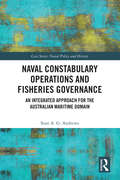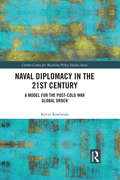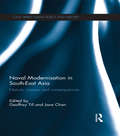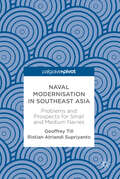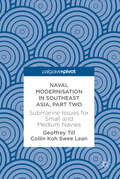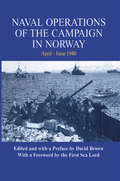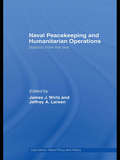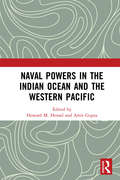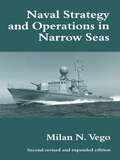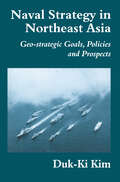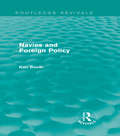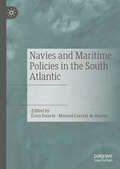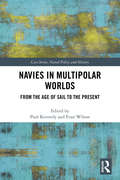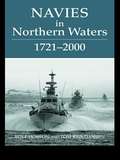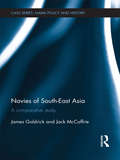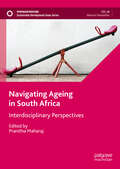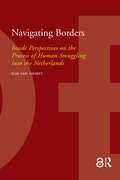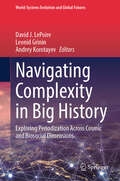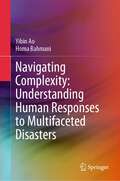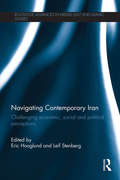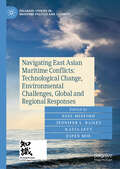- Table View
- List View
Naval Blockades and Seapower: Strategies and Counter-Strategies, 1805-2005 (Cass Series: Naval Policy and History)
by Bruce Allen Elleman Sarah C.M. PaineThis new collection of scholarly, readable, and up-to-date essays covers the most significant naval blockades of the nineteenth and twentieth centuries. Here the reader can find Napoleon’s Continental Blockade of England, the Anglo-American War of 1812, the Crimean War, the American Civil War, the first Sino-Japanese War 1894-95, the Spanish-American War, the First World War, the second Sino-Japanese War 1937-45, the Second World War in Europe and Asia, the Nationalist attempt to blockade the PRC, the Korean War, the Cuban Missile Crisis, the Vietnam War, the British blockade of Rhodesia, the Falklands War, the Persian Gulf interdiction program, the PRC "missile" blockade of Taiwan in 1996, and finally Australia's recent "reverse" blockade to keep illegal aliens out of the country. The authors of each chapter address the causes of the blockade in question, its long and short-term repercussions, and the course of the blockade itself. More generally, they address the state of the literature, taking advantage of new research and new methodologies to provide something of value to both the specialist and non-specialist reader. Taken as a whole, this volume presents fresh insights into issues such as what a blockade is, why countries might choose them, which navies can and cannot make use of them, what responses lead to satisfactory or unsatisfactory conclusions, and how far-reaching their consequences tend to be. This book will be of great interest to all students and scholars of strategic studies, military history and maritime studies in particular.
Naval Constabulary Operations and Fisheries Governance: An Integrated Approach for the Australian Maritime Domain (ISSN)
by Sean A. AndrewsThis book offers an analysis of naval constabulary operations, in particular Australian fisheries patrols, and challenges the widely accepted Anglo-American school of maritime thought.In the Indo-Pacific, fisheries and the activities of fishing boats are of increasing strategic importance in Australia’s region – Australia’s Four Oceans. Issues of overfishing, population growth and climate change are placing growing pressure on fish as a resource, and in doing so are making fisheries more significant, and significant on a strategic as opposed to simply an economic or environmental level. When, combined with the growing use of fishing vessels as para-naval forces, it is clear that the activities of fishing vessels, whether fishing or not fishing, are matters of considerable strategic relevance. This book illuminates contemporary seapower challenges, explains and defines maritime security and examines and refines existing theory to advance a set of new or refined concepts to help frame the on-water activities of constabulary operations -- reducing the possibility of on-water miscalculation between states.This book will be of much interest to students and scholars of naval studies and sea power, maritime strategy, maritime security and International Relations.
Naval Diplomacy in 21st Century: A Model for the Post-Cold War Global Order (Corbett Centre for Maritime Policy Studies Series)
by Kevin RowlandsThis book offers a detailed investigation of naval diplomacy, past and present, and challenges the widely accepted Anglo-American school of sea power thought. Despite the acknowledgement of the importance of the threat or use of force in the pursuit of policy since the dawn of strategic thought, the utility of seapower in operations other than war is poorly understood and articulated. Theorists have invariably viewed seapower in peacetime through the lens of hard power effects such as coercion and deterrence. Commentaries on engagement, interoperability and the forging of friendships are largely conspicuous by their absence. This book considers how all these strands of international politics can be better understood for use in the 21st century. The book explains and defines naval diplomacy, with existing theoretical frameworks being critically analysed. It reviews over 500 incidents from the post-Cold War era, drawing on this empirical evidence to determine that naval diplomacy remains a potent means of 21st century statecraft. It finds that existing understanding of naval diplomacy is insufficient and offers an alternative model, drawing on basic communication and stakeholder theories. The implications of the book relate directly to national security: naval deployments could be more effectively targeted; foreign activity at sea could be better understood and, if necessary, countered; finally, the ability of non-state actors to support national interests from the sea could, potentially, be better harnessed. This book will be of much interest to students of naval power, maritime security, strategic studies and International Relations.
Naval Modernisation in South-East Asia: Nature, Causes and Consequences (Cass Series: Naval Policy and History)
by Geoffrey Till Jane ChanThis edited volume analyses the naval arms race in South-East Asia, and reviews the content, purposes and consequences of the naval policies and development of the main countries of the region. The rise of naval capability in the countries of the Asia-Pacific Region is increasingly recognised as a major indicator of the ‘rise of Asia’ and its increasing importance in the world’s political, economic and strategic future. Most coverage focusses solely on the navies of the 'big four' – the US, China, India and Japan; however, the region’s other navies, though much smaller, are significant too. Given the current focus on the South China Sea and the Obama administration’s pivot to Asia, naval development in South-East Asia is of particular relevance. This book first identifies the issues involved in defence acquisition in this area. It then goes on to establish some templates of naval modernisation as a means of assessing the policies of individual countries in the region, by looking at the naval policies of the big four. Finally, the general issue of naval modernisation in South-East Asia is illustrated through a more detailed examination of some of the major issues common to all countries of the area. These include the defence-industrial perspective, specific examinations of submarine and surface ship acquisition processes, and a review of the balance to be struck between naval and coastguard forces in the area. This book will be of much interest to students of naval power, maritime security, South-East Asian politics, strategic studies, and IR in general.
Naval Modernisation in Southeast Asia
by Geoffrey Till Ristian Atriandi SupriyantoThis edited volume reviews the nature and consequences of naval modernisation in Southeast Asia against the backdrop of growing tensions over the South China Sea and increasing competition between the United States and China in the region. The varying problems and challenges facing the small and medium navies of the area as they seek to grow their maritime power in response to their perceptions of strategic need are compared and contrasted. The prospects of significant destabilisation of an already volatile area - even of a potential naval arms race, are carefully analysed. There can be little doubt that naval modernisation in Southeast Asia is a key indicator of the likely future of the Asia Pacific and also illustrates the problems faced by small and medium powers in a world dominated by the great. Accordingly this book will be of much interest to students and teachers focusing on security in the Asia Pacific region as well to those concerned with naval development in genera l.
Naval Modernisation in Southeast Asia, Part Two
by Geoffrey Till Collin Koh Swee LeanThis edited volume starts with an account of the submarine in naval warfare and moves on to review the nature and consequences of naval modernisation in Southeast Asia by considering their acquisition by the small and medium navies of the region. It explores the reasons for these navies taking on this very substantial and demanding challenge, the problems they are facing and the consequences of the deployment of submarines for regional stability. Given the backdrop of growing tensions over the South China Sea and increasing competition between the United States and China in the region, will the arrival of submarines in the area help or hinder the cause of peace? This volume will be of substantial interest not just to those interested in submarines and naval development but also to students and teachers concerned about the very volatile developing situation in and around the South China Sea.
Naval Operations of the Campaign in Norway, April-June 1940 (Naval Staff Histories)
by David BrownThis is the official Naval Staff history of the Norway campaign, originally published internally in 1951. It covers the period from early April 1940 to the completion of operations in June. The operation involved most of the Royal Navy's ships in the Home theatre at the time.
Naval Peacekeeping and Humanitarian Operations: Stability from the Sea (Cass Series: Naval Policy and History)
by James J. Wirtz Jeffrey A. LarsenThis edited volume explores stability, security, transition and reconstruction operations (SSTR), highlighting the challenges and opportunities they create for the US Navy. The book argues that SSTR operations are challenging because they create new missions and basing modes, and signal a return to traditional naval methods of operation. Mission accomplishment requires collaboration with a wide range of actors representing governmental, non-governmental and commercial organizations, which often creates politically and bureaucratically charged issues for those involved. However, although from a traditional warfighting perspective, stability operations might be viewed as having little to do with preparing for high-intensity conventional combat, these kinds of operations in fact correspond to traditional missions related to diplomacy, engagement, maritime domain awareness, piracy and smuggling, and intervention to quell civil disturbances. SSTR operations can be therefore depicted as a return to traditional naval operations, albeit operations that might not be universally welcomed in all quarters.
Naval Policy and Strategy in the Mediterranean: Past, Present and Future (Cass Series: Naval Policy and History #No. 10)
by John B. HattendorfMaritime strategy and naval power in the Mediterranean touches on migration, the environment, technology, economic power, international politics and law, as well as calculations of naval strength and diplomatic manoeuvre. These broad and fundamental themes are explored in this volume.
Naval Powers in the Indian Ocean and the Western Pacific
by Amit Gupta Howard M. HenselA vital component of the interdependent global economy, maritime transit routes are nowhere more critical than those traversing the Indian Ocean and the Western Pacific. Previously, areas of the Indian Ocean and Western Pacific have been viewed as separate and discrete political, economic, and military regions. In recent years, however, a variety of economic, political, and military forces have created a new understanding of these maritime expanses as one zone of global interaction. <P><P>This book complements the material presented in its companion volume, Maritime Security in the Indian Ocean and the Western Pacific, by analysing the perceptions, interests, objectives, maritime capabilities, and policies of the major maritime powers operating in the Indian Ocean and the Western Pacific. In addition, the book also assesses the contemporary maritime challenges and opportunities that confront the global community within what is rapidly becoming recognised as an integrated zone of global interaction. <P><P>A valuable study for researchers and policymakers working in the fields of maritime security; military, security and peace studies; conflict resolution; and Asian affairs.
Naval Strategy and Operations in Narrow Seas
by Milan N. VegoMany books and articles have been written on wars in narrow seas. However, none deals in any comprehensive manner with the problems of strategy and conduct of naval operations. The aim of this book is to explain in some detail the characteristics of a war fought in narrow seas and to compare and contrast strategy and major operations in narrow seas and naval warfare in the open ocean..
Naval Strategy in Northeast Asia: Geo-strategic Goals, Policies and Prospects (Cass Series: Naval Policy and History)
by Duk-Ki KimOver the past decade, Northeast Asia has been dominated by quite significant strategic change, which is ongoing and brings with it many uncertainties. naval capabilities in Northwest Asia are instrumental in promoting maritime security interests - helping to build a stable security environment through active participation in regional naval co-operation. This landmark book explores the region's maritime peace and stability, and examines in depth the strategic, military and apolitical issues that underpin any effort to develop maritime co-operation.
Navies and Foreign Policy (Routledge Revivals)
by Ken BoothFirst published in 1977, this study offers a comprehensive, systematic and integrated survey of the important relationship between navies and the making and execution of foreign policy. Ken Booth explains the functions navies can perform in both war and peace, the influence they have on particular situations, and how the relevant organisations can affect the character of naval actions. Ultimately, navies are regarded as indispensable instruments of the state by a number of countries, whilst all countries with a coast find some need to threaten a degree of force at sea. This book provides students and academics with the intellectual framework with which to assess the changing character of the navy.
Navies and Maritime Policies in the South Atlantic
by Érico Duarte Manuel Correia de BarrosThis edited volume analyzes national security issues with maritime implications, and, specifically, naval projects and postures of main South Atlantic countries: Brazil, Argentina, Nigeria, and South Africa. Additionally, it provides comprehensive and multi-level analysis of the interplay among national interests in the processes of demarcation of limits of the continental shelf and contention among Uruguay, Chile, Argentina, and the United Kingdom in the Southern Atlantic and the Antarctica. This book will interest scholars, researchers, and students in the fields of Latin American politics, regional studies, foreign and defense policy, and maritime security.
Navies in Multipolar Worlds: From the Age of Sail to the Present (Cass Series: Naval Policy and History)
by Paul Kennedy Evan WilsonRecent challenges to US maritime predominance suggests a return to great power competition at sea, and this new volume looks at how navies in previous eras of multipolarity grappled with similar challenges. The book follows the theme of multipolarity by analysing a wide range of historical and geographical case studies, thereby maintaining the focus of both its historical analysis and its policy implications. It begins by looking at the evolution of French naval policy from Louis XIV through to the end of the nineteenth century. It then examines how the British responded to multipolar threat environments, convoys, the challenges of demobilization, and the persistence of British naval power in the interwar period. There are also contributions regarding Japan’s turn away from the sea, the Italian navy, and multipolarity in the Arctic. This volume also addresses the regional and global distribution of forces; trade and communication protection; arms races; the emergence of naval challengers; fleet design; logistics; technology; civil-naval relations; and grand strategy, past, present, and future. This book will be of much interest to students of naval history, strategic studies and international relations history, as well as senior naval officers.
Navies in Northern Waters (Cass Series: Naval Policy and History #Vol. 26)
by Rolf Hobson Tom KristiansenNavies in Northern Waters is a collection of articles covering the roles played by the secondary navies of northern European powers and the United States within the maritime balance of power. The contributions covering the 18th and 19th centuries focus on their relations with each other as they sought to create a counterweight to the dominant naval power of Britain. The inter-war years are treated from the perspectives of international disarmament efforts within the framework of collective security, and the subsequent naval rivalry in the Baltic area in the years leading up to the Second World War. For the post-1945 period, the contributions concentrate on superpower rivalry in northern waters during the Cold War, the changing aspects of security policy since the collapse of the Soviet Union and the particular challenges facing small coastal states policing extensive waters of increasing economic importance.
Navies of South-East Asia: A Comparative Study (Cass Series: Naval Policy and History)
by James Goldrick Jack McCaffrieThis book provides a comprehensive survey of the development and operations of the navies of South-East Asia since the end of World War II. The navies of South-East Asia have rarely been the subject of systematic attention but, as the maritime strategic balance within Asia becomes more complex and open to challenge through the rise of China, they will play increasingly significant roles. While most have had only limited strength in the past, the majority are acquiring new capabilities, notably submarines, which will profoundly alter their ability to influence events. This volume outlines the difficulties that each navy has faced in developing capability in competition, not only with local armies and air forces, but with other national requirements. The authors analyse the way in which each has been shaped by history and by changing maritime strategic concepts, particularly through developments such as the 1982 Law of the Sea Convention. Drawing upon this contextual information, the book goes on to examine how the navies are likely to develop in the future, what new challenges they will face and the nature of the roles they will play within a region of increasing global strategic significance. This book will be of much interest to students of naval policy, SE Asian politics, regional security, strategic studies and IR in general.
Navigating Ageing in South Africa: Interdisciplinary Perspectives (Sustainable Development Goals Series)
by Pranitha MaharajThis book systematically explores the lives and varied experiences of older people in South Africa. Though a relatively youthful country, the share of the population aged sixty and above in South Africa is increasing steadily and is projected to reach 10% of the population by 2025. Population ageing is having major and far-reaching implications for a country with widespread poverty, changing household structures, a heavy burden of communicable diseases, and inadequate health infrastructure. Pandemics, such as HIV/AIDS and COVID-19, exacerbate many of the challenges faced by older people. Drawing on original research from national surveys and case studies, this book explores the various experiences and challenges of older people in their daily lives, such as their healthcare, social and family lives, their socio-economic status, mental health, and what it means to be an older person in South Africa today.
Navigating Borders: Inside Perspectives on the Process of Human Smuggling into the Netherlands (IMISCOE Dissertations)
by Ilse van LiemptNavigating Borders into the Netherlands provides a unique in-depth look at human smuggling processes. Based on biographical interviews with smuggled migrants in the Netherlands, the study reveals considerable differences that exist in smuggling's underlying causes, how journeys evolve, and outcomes of the process. This research from an insider's perspective clearly demonstrates that smuggled migrants are not passive actors, there is a broad variety in types of smugglers, and interactions between migrants and smugglers largely determine how the smuggling process evolves.
Navigating Complexity in Big History: Exploring Periodization Across Cosmic and Biosocial Dimensions (World-Systems Evolution and Global Futures)
by Leonid Grinin Andrey Korotayev David J. LePoireThis book explores periodization in Big History against the background of complexity growth across the Universe, on our planet, and in biological, social, and cultural systems. It traces the accelerating rise in complexity throughout history and the major historical transformations involved in the evolution of life, humans, and civilization. It draws on concepts from physics and evolutionary biology to offer potential models of the underlying mechanisms driving this acceleration, along with potential clues to how it might end. In the editors&’ introduction (Chapter 1), the effort to periodize is placed within the historical context along with considerations from complexity science. Subsequent chapters explore various aspects of periodization and complexity by (a) identifying symmetrical cosmic and biosocial trends, (b) testing rigor and criteria for evaluating periodization, (c) attempting to integrate different approaches through multiple perspectives, (d) proposing different strategies for determining geometric patterns in terrestrial bio-social evolution, and (e) applying the traditional threshold model to gain insights into possible future pathways. A concluding chapter identifies commonalities, research gaps, and possible approaches to integration as the current state of the world system rapidly evolves, while also offering a deeper understanding of complexity dynamics and historical processes. Each chapter includes an extensive bibliography, allowing a deeper and more detailed examination of the issues covered.
Navigating Complexity: Understanding Human Responses to Multifaceted Disasters
by Yibin Ao Homa BahmaniThis thought-provoking book unravels the intricate interplay between human behavior and disasters, weaving a rich narrative that transcends traditional boundaries. Embark on a captivating exploration of human responses to multifaceted disasters with this book. Unveiling the human psyche and the intricate web of emotions that intertwine with disaster events, this book offers a profound understanding of human responses to multifaceted disasters.Written with precision and meticulous research, this book captivates scholars, practitioners, and policymakers alike. Its multidimensional perspectives offer valuable insights for disaster management, urban planning, sociology, and public health, transcending disciplinary boundaries.
Navigating Contemporary Iran: Challenging Economic, Social and Political Perceptions (Routledge Advances in Middle East and Islamic Studies)
by Eric Hooglund Leif StenbergThis detailed examination of contemporary Iran addresses the most important current social, political, and economic issues facing the nation and the way it is perceived by the outside world. The volume brings together some of the most important scholars and researchers in the field, working in such diverse disciplines as anthropology, economics, history, international relations, philosophy, political science, and sociology, to offer a broad range of perspectives on the significance of three decades of changes for Iran’s current and near-term-future domestic and international politics. Drawing upon a wealth of original field research, the authors challenge conventional wisdom and simplistic media stereotypes about the Islamic Republic. The chapters reach beyond traditional images of the country to show that, as a consequence of thirty years of economic and social changes, the reality, or ‘essence’, of contemporary Iran is more complex and nuanced than is often portrayed in the international media. Offering valuable insights into Iran’s economic and social policies, as well as its politics, since the Islamic Revolution, this book will be of great interest to students and scholars of political science, sociology, and Iranian studies.
Navigating Digital Transformation: The Dynamics of Educational Technology Adoption (Assessment of Educational Technology)
by Longwei ZhengThis book explores the process of educators’ technology adoption, which is crucial for digital transformation in today's educational landscape. It is based on rigorous research which highlights the dynamics of technology adoption, the evolution of institutional culture, and the development of digital artifacts as educators navigate the incorporation of educational technology. Through a thorough analysis of the complex factors influencing technology adoption, the book seeks to bridge theory and practice, technology and teaching methods, policy, and execution, to promote more effective and meaningful educational innovation and transformation.This book confronts the challenges within this field by illustrating the development process of teachers' technology adoption. It introduces novel representations and analytics of technology adoption dynamics, offering new insights into the mechanisms behind teachers' technological understanding beyond mere self-reported acceptance. Through a thorough analysis of the complex factors influencing technology adoption, the book seeks to bridge theory and practice, technology and teaching methods, policy, and execution, to promote more effective and meaningful educational innovation and transformation. To study the short- and long-term effects that may improve the assessment of interventions, the author proposes a dynamic model. The reader is also introduced to a framework based on a downscaling scheme that can project cultural factors of the institution onto a teacher’s implementation behaviour. The book further considers navigating through technological integration by inspecting technology-related quality of teaching artifacts. It considers patterns of integrating digital tools and teaching practice that can be identified by examining the technology-specific quality of digital artifacts shaped by teachers.This book targets several key groups in the education sector, including educators, researchers, policymakers, and educational technology professionals. The author shares the knowledge to support the integration of technology and transformation in education by providing interdisciplinary perspectives and practical strategies.
Navigating East Asian Maritime Conflicts: Technological Change, Environmental Challenges, Global and Regional Responses (Palgrave Studies in Maritime Politics and Security)
by Paul Midford Espen Moe Katja Levy Jennifer L. BaileyAs technological development and diffusion have greatly increased the resources states can recover from maritime space, the stakes of these conflicts have grown. Nowhere is this clearer than in East Asia. This book examines how technological change and diffusion impact East Asian maritime conflicts, and approaches for conflict management and resolution.
Navigating Europe’s Socio-Economic Crisis: The Impact of Inflation, the Energy Crisis, and the Conflict in Ukraine on the Czech Republic and Beyond
by Robin MaialehThis book provides an insightful guide to the economic challenges currently defining Europe. With a particular focus on the Czech economy, it examines the impact of rampant inflation, the war in Ukraine, and the energy crisis and evaluates the social impacts of them. Through an empirical analysis, the asymmetric effects of these shocks are highlighted in relation to different social groups. Furthermore, it engages with related issues such as migration and integration policies, the evolution of the labour market, disparities in inflation’s impact, and household energy expenditure. This book presents a practical policy framework for addressing inflation, the impact of the Ukraine conflict, and the energy crisis. It will be relevant to scholars, researchers, and policymakers interested in the political economy, labour economics, and economic policy in general.

